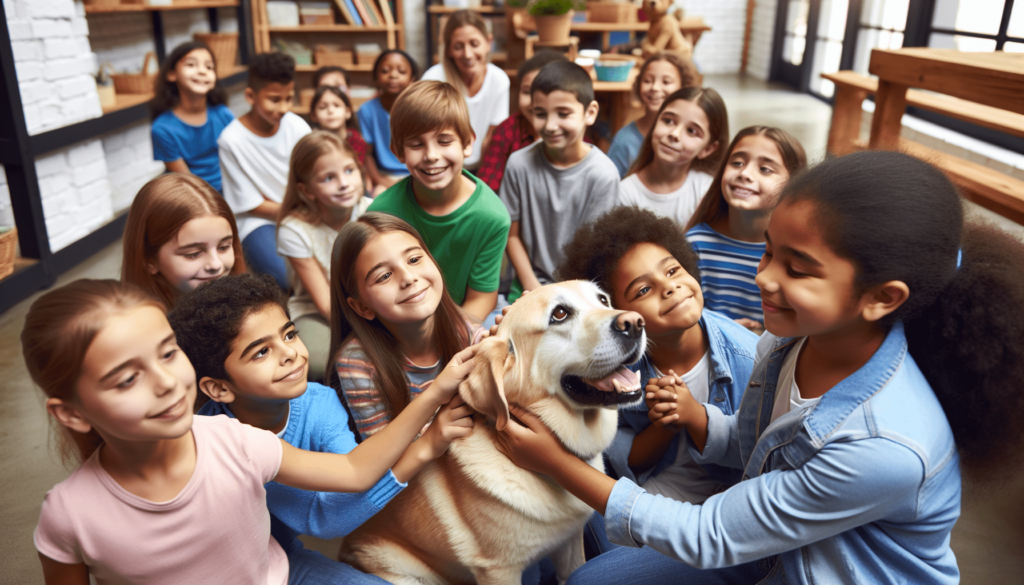The Role Of Pets In Community Outreach Programs
Have you ever wondered about the impact that pets can have in community outreach programs? Pets play a vital role in bringing comfort, joy, and companionship to those in need. In this article, we will explore the various ways in which pets are involved in community outreach programs and how they make a difference in the lives of individuals and communities.
Benefits of Pets in Community Outreach Programs
Pets have a special way of connecting with people and providing emotional support in times of need. Whether it’s visiting nursing homes, hospitals, or schools, pets bring a sense of happiness and relief to those they encounter. Their presence can help alleviate stress, anxiety, and loneliness, making them valuable assets in community outreach programs.
Did you know that therapy animals are specifically trained to provide comfort and support to individuals in various settings? These animals undergo rigorous training to ensure that they can handle different environments and situations. Their calm and gentle demeanor make them well-suited for interacting with people who may be going through challenging times.
Emotional Support
Pets have a unique ability to sense when someone is in distress and offer comfort without judgment. Their unconditional love and companionship can have a profound impact on individuals struggling with mental health issues, trauma, or grief. In community outreach programs, pets provide emotional support to those who may be feeling isolated or overwhelmed, helping them feel more at ease and understood.
Socialization
Pets also play a crucial role in promoting socialization and human interaction. In settings such as therapy sessions or support groups, pets can serve as a conversation starter and icebreaker, allowing individuals to connect with one another in a relaxed and comfortable environment. This socialization can help combat feelings of loneliness and create a sense of camaraderie among participants.
Stress Relief
Interacting with pets has been shown to reduce stress levels and promote relaxation. Petting a dog or cat can release oxytocin, a feel-good hormone that helps lower blood pressure and heart rate. In community outreach programs, pets offer a form of natural stress relief that can benefit both the recipients of the program and the volunteers involved. Their presence can create a sense of calm and peace in an otherwise hectic or challenging environment.
Involvement of Pets in Community Outreach Programs
Pets are involved in a variety of community outreach programs that aim to support vulnerable populations and promote overall well-being. From animal-assisted therapy to pet adoption events, pets play a pivotal role in spreading positivity and making a difference in the lives of others.
Animal-Assisted Therapy
Animal-assisted therapy involves the use of trained animals to help individuals achieve specific therapeutic goals. This form of therapy is conducted under the guidance of a licensed therapist or professional who oversees the interaction between the animal and the individual. Pets, such as dogs, cats, horses, and even rabbits, can be part of animal-assisted therapy programs that cater to various needs, including mental health issues, physical disabilities, and emotional trauma.
Pet Adoption Events
Pet adoption events are a common way for communities to come together and support their local animal shelters and rescue organizations. These events provide an opportunity for pets in need of homes to interact with potential adopters and showcase their unique personalities. By participating in pet adoption events, individuals can learn about responsible pet ownership, support animal welfare initiatives, and make a positive impact on the lives of homeless animals.
Educational Programs
Pets are also utilized in educational programs that aim to teach children and adults about animal care, empathy, and compassion. Schools, libraries, and community centers often host programs that feature therapy animals or service animals to educate participants about the importance of treating animals with respect and kindness. These educational programs instill values of empathy and responsibility in individuals, fostering a sense of connection and understanding between humans and animals.

How To Get Involved
If you are interested in getting involved in community outreach programs that involve pets, there are several ways you can contribute to these initiatives and make a difference in your community. Whether you have a pet of your own or simply want to volunteer your time and support, there are opportunities available for individuals of all ages and backgrounds.
Volunteer at a Local Animal Shelter
One of the most direct ways to support pets in community outreach programs is by volunteering at a local animal shelter or rescue organization. You can help walk dogs, socialize cats, assist with adoption events, or provide administrative support to help these organizations fulfill their mission. Volunteering at an animal shelter allows you to make a tangible impact on the lives of homeless pets and contribute to the well-being of your community.
Become a Therapy Animal Team
If you have a well-behaved and trained pet, you may consider becoming a therapy animal team to participate in animal-assisted therapy programs. Organizations such as Pet Partners and Therapy Dogs International offer certification and training for therapy animal teams, allowing you to visit hospitals, schools, nursing homes, and other facilities to provide comfort and support to those in need. Being part of a therapy animal team is a rewarding experience that can bring joy and healing to both you and the individuals you interact with.
Attend Pet Adoption Events
Attending pet adoption events is a fun and meaningful way to support homeless animals and make a difference in your community. By interacting with adoptable pets, spreading awareness about adoption, and encouraging responsible pet ownership, you can help increase the chances of animals finding loving forever homes. Pet adoption events also provide an opportunity to connect with like-minded individuals who share a passion for animal welfare and community outreach.
Conclusion
Pets play a crucial role in community outreach programs by providing emotional support, promoting socialization, and offering stress relief to individuals in need. Their presence can have a positive impact on the well-being of communities and contribute to the overall happiness and health of society. By recognizing the valuable contributions of pets in community outreach programs and getting involved in these initiatives, you can help create a more compassionate and inclusive community where both humans and animals thrive.


